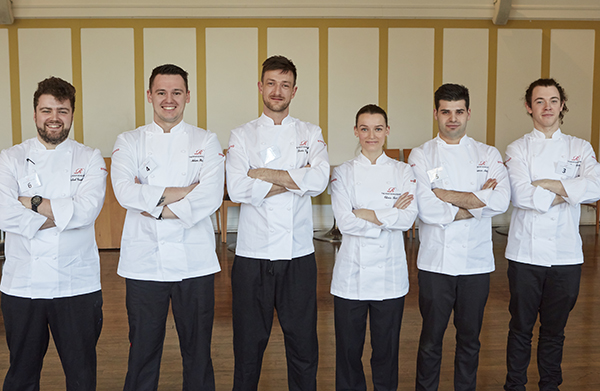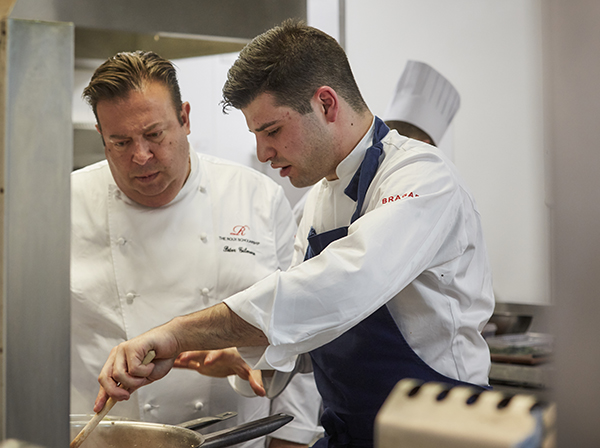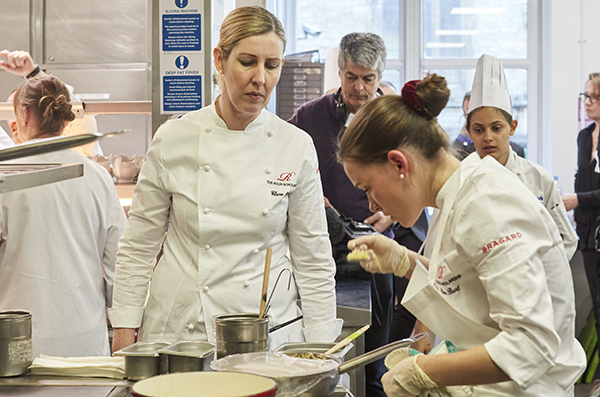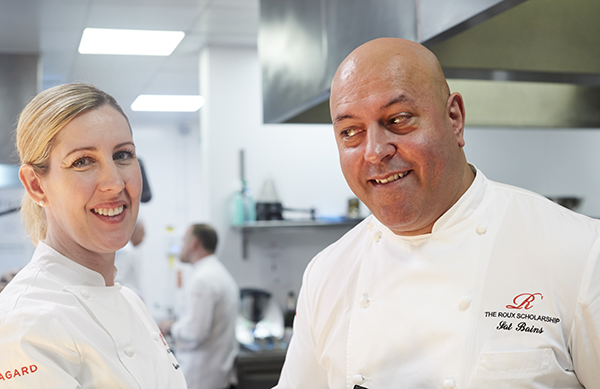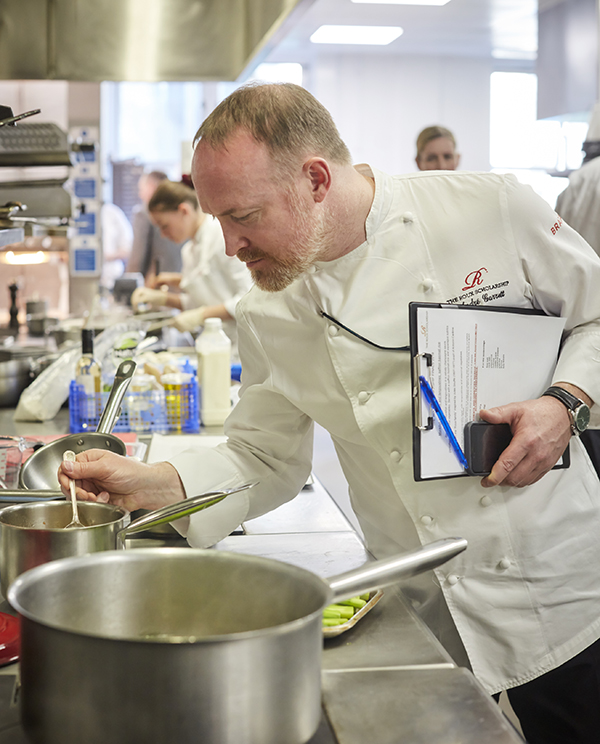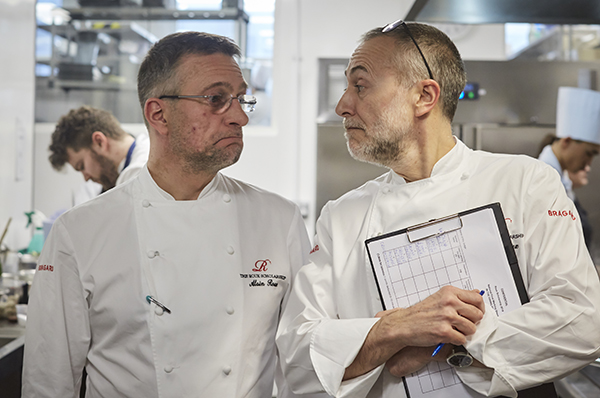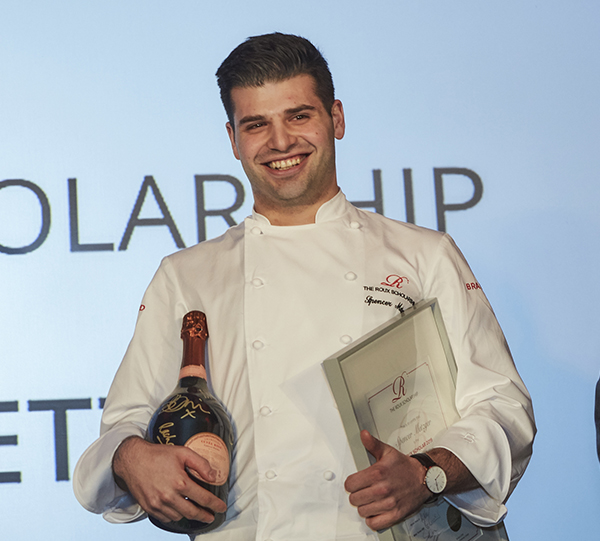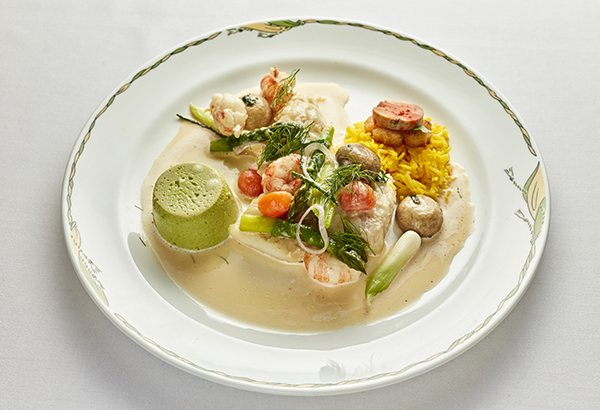Six of the UK's finest young chefs gathered at Westminster Kingsway last week, but only one could be crowned this year's Roux scholar. Fiona Sims joined the judges for a front-row seat
A hush descends over the restaurant at London's Westminster Kingsway College. The usual dining tables have been cleared to make way for six individual chairs and small tables for each of the finalists of the Roux Scholarship 2019. Their chatter ebbs away as the judges enter the room in a solemn single line.
Says Michel Roux Jr, chef-patron at Le Gavroche, London: "You're here because we know you are good enough. The next Roux scholar is in this room. Let that sink in.
Shoulders now a little more relaxed, the competitors finally get to hear what they are about to cook – monkfish blanquette and langoustines with saffron basmati rice. "The dish is based on a classic but there's a lot of room there for imagination. We want to see your personality in the dish," challenges Michel.
It sounds straightforward enough. It's a French country cooking classic, more typically a ragoût of white meat (veal, lamb or poultry) cooked in white stock or water with aromatic flavourings, says Larousse Gastronomique, which also goes on to say that, theoretically, the sauce is made by making a roux and adding cream and egg yolks, but that the roux is more often than not omitted. Blanquettes are also made with fish, particularly monkfish.
Of course, this recipe has been given the Roux spin; they in turn were inspired by a recipe from Jules Gouffé (1807-1877, a pupil of Antonin CarÁªme). This Roux version has a velvety Champagne sauce and is garnished with seasonal vegetables. Instead of the traditional accompaniment of rice Á la creole, it's served with a saffron basmati rice and asparagus subrics (Larousse translation: small croquettes sautéed in clarified butter, using ingredients bound with allemande or béchamel sauce, eggs, flour, cream, et al).
The list of ingredients that the finalists have been given to use can be adapted or omitted according to their preference, says the recipe in front of them, among them samphire, nutmeg, monkfish liver and cheeks.
The finalists bury their heads in their chosen reference books in the allotted pre-cooking study time, among them Escoffier, Larousse and assorted Roux, plus a couple of Le Répertoire de la Cuisine by Louis Saulnier, first published in 1914.
The chefs, who must all be under 30 years old to qualify, will have just two and a half hours to cook the dish, which must be served two different ways – two portions plated and two portions served in a cast iron casserole (a nod to its Bourgeois roots), the lot placed in front of the eight judges.
Competing in the final for the second time is Michael Cruickshank from Bohemia in Jersey, who reached the final in 2017. Joining him is the only female chef in the group, Olivia Burt from Claridge's in London, and Ryan Baker from the Ritz London hotel, who is joined by his colleague Spencer Metzger, and then Adam Harper from the Cavendish hotel in Baslow, Derbyshire, and finally Lewis Linley from contract catering company Vacherin.
This year's honorary president of judges is Australian cooking star Peter Gilmore of Quay in Sydney, alongside joint chairmen Alain Roux and Michel Roux Jr. They are joined by Brian Turner, president of the Royal Academy of Culinary Arts; Clare Smyth, chef-patron of Core, London; and James Martin of James Martin Manchester; alongside earlier Roux scholars André Garrett (2002), executive head chef of the Corinthia Hotel London, and Sat Bains (1999) of Restaurant Sat Bains, Nottingham. The winner is set to be announced later that day at an awards ceremony at the Mandarin Oriental Hyde Park London.
There is gaping hole where head scholar Andrew Fairlie once stood, winner of the very first Roux Scholarship in 1984, and who died in January following the diagnosis of a brain tumour 14 years earlier. "Andrew was always smiling, always positive and he would not have wanted us to be sad on this occasion. The competition very much mirrors the person Andrew was: uplifting and about giving back," Michel said later that day at the award ceremony.
Burt is first up. She's the only woman in the final – indeed the only woman in the final for four years (the last was Sabrina Gidda in 2015). "Olivia did very well in the cook-off so she's here on merit, as it should be," says Michel, as he watches her prepare asparagus.
"I don't think timing will be an issue this year. The biggest hurdle, I think, will be getting those fish cooked right, and how they serve it will be interesting to see. We don't specify whether it should be small pieces of fillet or a whole fish. And not many of them will know how to approach the liver," he ponders.
Smyth is equally intrigued by how each finalist will approach the liver. "I'd serve it on toast, or in a ballotine," she says, scrutinising their vegetable prep, and wondering why some are peeling the asparagus for the subric. "You only need to remove the woody part. People just peel it without thinking. You need to respect vegetables, which means they need to think about how each vegetable should be prepared."
James Martin approves of the finalists who have chosen to turn their mushrooms. "It gives the dish that little bit extra. In fact, I'd turn all my veg for this one," he says. "The biggest hurdle after cooking that fish perfectly is the sauce. If they use egg yolks, will they end up scrambled? But it tastes so much better with eggs."
"Last time I made something like this, I was at Orrery [in London's Marylebone]," whispers Garrett. "It takes a lot of kitchen organisation to turn out a dish like this in a restaurant. The sauce is a key element that will bring it all together. We're looking for consistency in the sauce and maximum flavour," he says, armed with a spoon to try various stockpots.
Bains frowns when he clocks a couple of the finalists failing to smash the langoustine claws before adding them to the stockpot. "It would have extracted so much more flavour. That's a basic – they should have been taught that," he observes, also noting a finalist's long ago-cooled, blanched monkfish left uncovered on the side. "Put it in your pocket, I don't care, as long as it's covered," he mutters.
Turner has a grumble, too, when he watches a finalist walk past his bubbling stockpot and ditch his mushroom trimmings in the bin. "You need to get enough body in the stock before you start reducing it. It's a different generation," he mumbles. Turner has covered every Roux Scholarship final bar one. "You only have to look at the machines they're using now to see how much has changed," he says.
Gilmore, meanwhile, is on constant patrol. "It's interesting to see all their different approaches – only one of them is keeping the fish on the bone. But overall, I'm pretty impressed with their working methods," he says.
Gilmore leapt at the invite to become honorary president of the judges. "The Rouxs are legends in the industry; winning this carries a lot of weight and opens a lot of doors. Just entering is important as it gets you thinking about your career and where you sit among your contemporaries. It's also a great opportunity to meet your contemporaries – these relationships will last your whole career," he says.
It appears things aren't any different in Australia when it comes to the skills shortage. "It's so important for all young chefs to have a grounding in the classics. You can't reinvent the wheel. There's always so many little things you can take from this sort of recipe that you can apply to modern cooking," says Gilmore.
But as you probably won't see blanquette of monkfish on the menu at Quay in Sydney any time soon, how does Gilmore keep his staff well versed in the classics? "We rotate our young chefs on the staff meals, asking them to make a classical dish or pasta from scratch – that sort of thing. I think the onus is on established chefs to encourage young chefs this way. You can't put all the blame on young chefs for their lack of skills. The structure has changed so much these days that it's tempting to fast-track people, but chefs need to have 10 years of hard graft behind them. You need that background knowledge and experience to progress," he warns.
Alain is happy with the way all the chefs are conducting themselves. "There's no signs of stress or panic. If that happens, it will be in the last 20 minutes. Some might think this isn't a difficult dish, but our aim is not to make the chefs panic. That's not the purpose of this competition," he says.
Smyth says: "It's so important for a chef to enter these competitions. You need to measure yourself against others. You learn so much that way and gain so much experience."
So what did the finalists learn? "I'd hoped the recipe would be something like that – though I've only cooked a blanquette once before,"confesses Burt. "The subric was the trickiest bit. I'm so glad I've done it, though. You meet so many people and it teaches you a lot about yourself: from how you work, to how fast you do something. It's like learning to cook again, entering this."
It's the last year for Lewis, as he has just turned 30. "I always thought I'd never be ready, but this year I thought, why not go for it? You're always better than you think you are. It was really good, in fact. Stressful, yes, but brilliant. Getting to the final was a real ego boost."
Harper was surprised by how calm he was throughout. "You've got all the best chefs looking over your shoulder, so there is this immense pressure there, but it was OK. I kept telling myself, you've got to the final. And I'm getting my name out there."
Baker, who is a chef de partie at the Ritz London, wasn't at all happy with his subric. "It didn't set, but it doesn't matter. This whole exercise has taught me so many things – not least to keep a clear head. I'll learn from those mistakes."
And Cruickshank will return to Jersey knowing he got very close once again to becoming a Roux Scholar. "It's a good competition as it tests you in so many ways. I'll be back," he says.
But it was Metzger who won the day – on a first attempt, too. "I went into that final thinking I could win it, but it was important to enjoy it, too – I cook so much better when I'm smiling. I could see that the recipe had a lot of room for interpretation but I kept remembering something John [Williams, executive chef at the Ritz London] told me. He said 'do what you do, but respect the classics and fundamentals and you'll be alright.' And he was right, wasn't he?"
On the winner: Spencer Metzger
"We have a super-talented new scholar. Spencer understands flavour; the sauce for the blanquette was sublime – so much so that the judges fought over the last drop."
Michel Roux Jr
"He executed the dish immaculately. It was really hard to find fault. The presentation was great but also the depth of flavour was fantastic. When it came out we all looked at each other and said: 'yes, that is how it should be done!' He has been outstanding throughout the competition, he really deserved to win."
Clare Smyth
"It was his command in the kitchen that impressed – you could just see his discipline, his work ethic and the way he spoke and gave instructions to his commis. His dish had depth in the sauce; the fish was perfectly cooked; everything was very well seasoned. He has a great future ahead of him and let's not forget his mentor – John Williams."
Sat Bains
"Spencer's dish showed that he understood all the elements of the dish in its original classic form, while still allowing him to put his own signature on it. I have known and watched Spencer over the years; his character and his classic training under chef John Williams will make us all proud to have him as a Roux scholar."
Brian Turner
"Spencer will be a great ambassador. He's eloquent, intelligent and well rounded – a good guy. He smashed it on the day. He got everything right. The fish was cooked perfectly – even the cheek, which is not so easy. His sauce was velvety; the asparagus subric was perfect – one of the only finalists to get that right. Spencer was a clear winner."
André Garrett
Profile: Spencer Metzger
Spencer Metzger is the latest to join the cohort of chefs to have won the Roux Scholarship the first time around: most recently Luke Selby in 2017, Ian Scaramuzza in 2015, and now Metzger. This is the country's toughest chef competition, yet Metzger sailed through the regionals and semi-finals to take the top spot.
Who was the first person he thanked on receiving his prize? John Williams, executive chef of the Ritz. "I didn't get emotional at all until John gave me a hug to congratulate me. He's my mentor – he has always guided me," he credits.
Metzger, 26, is one of six sous chefs at the Ritz. He has worked at the prestigious hotel for nine years, first as an apprentice, then working his way up to sous chef, a position he has held for three years.
The bug bit when he picked the Ritz for work experience while still at school, aged 15.
"I wasn't sure what I wanted as a career. I did some cooking at school and was really good at it. I Googled the Ritz, got through to HR and asked whether I could come in for a few days. I loved it. John encouraged me to apply to catering college at Bournemouth and that was it, really. The course was unbelievable – I even did a blanquette while I was there. You think that you are never going to use these kind of classical skills, but you do, time and again," says Metzger.
"My mates thought I was mad. They said that being a chef would be too hard, the hours too long. But the more I studied, the more I got into it. And it was good fun," he says.
"Now I spend all my money on travelling to eat. High points? Noma [Copenhagen, Denmark] and Faviken [JÁ¤rpen, Sweden]. I've eaten my way around the whole of London. I love seeing the different approaches, how the chefs' personalities come through – that's key for me. At Restaurant Sat Bains, for example, you can really see him in that restaurant."
Best and worst moments of the final? "I love making sauces. The worst moment was getting the subric out of the mould – I could see others struggling, but I managed to ease them out. This is why every chef should enter: you need to see what you are up against, to keep testing yourself. You learn so much from your mistakes. I admire the Roux family and what they stand for and I wanted to be a part of that, to help inspire the next generation of chefs."
To prepare, Metzger watched every video of the competition since its inception in 1984. He practiced dishes, too. "Recipes that are seriously classical and seriously expensive – such as a sole soufflé with lobster and sauce Nantaise. I even boned a duck and stuffed it."
Future goals? "I'd be lying if I said that I didn't have dreams about running my own place one day. But I love being at the Ritz, and I'm so happy with where we are with the food right now, so I'm not looking at anything else. I'll be right here for a long time yet."
The winning dish: monkfish blanquette
"It might look like a simple French country dish but it's deceptively tricky. Getting the maximum flavour into that sauce, which has got to coat that fish in a velvety way, and then poaching that monkfish without shrinking it too much, and getting the texture of that subric right – it's quite something to pull off."
André Garrett
"It's a very classic dish. It's not the sort of thing that's cooked very often these days, but it levels the playing field. You can practice and practice until you get a dish right, but this one takes them out of their comfort zone so you can really see how they cook."
Peter Gilmore
"Their goal is to create a dish which ticks the boxes classically but allows them to put their signature on it. I think the subric will be the real test – to get that texture, look and flavour right. The true measure will be when people ask, 'Can I have some bread to mop it all up?'"
Brian Turner
Continue reading
You need to be a premium member to view this. Subscribe from just 99p per week.
Already subscribed? Log In


